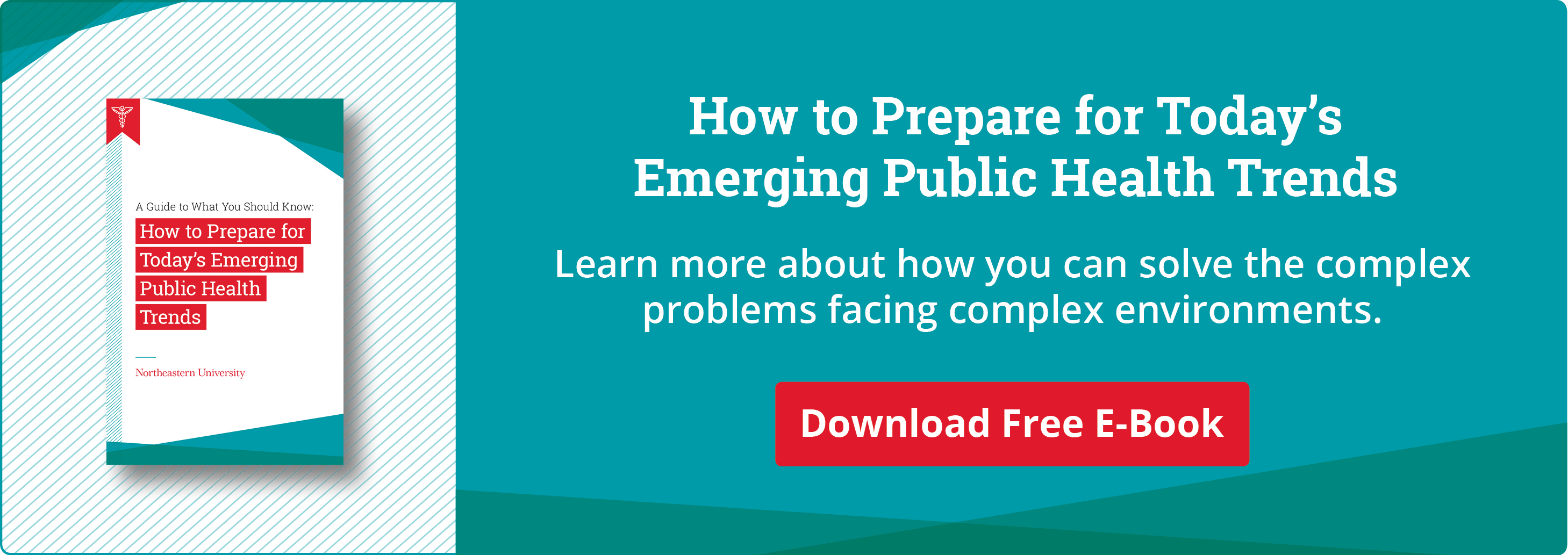Social justice is central to today’s practice of public health—and this is where you can play a critical role. Aspiring public health professionals have ample opportunity to tackle inequities, promote social justice, and pursue a broad range of careers that allow you to make a meaningful difference in the world.
Below, Neil Maniar, director of Northeastern University’s Master of Public Health program, shares his insights on the career paths available for those pursuing an advanced degree in public health. Throughout his career, Maniar has addressed inequities through public health practice and policy and now helps prepare students for a similar path.
Prior to joining Northeastern University, he served as Vice President of Health Systems for the American Cancer Society and Director of Health Equity Programs in the Brigham and Women’s Hospital Center for Community Health and Health Equity. Maniar also created the first statewide youth violence prevention program within the Massachusetts Department of Public Health.
Download Our Free Guide to Preparing for a Career in Public Health
Learn more about how you can solve the complex problems facing complex environments.
How Does Social Justice Intersect With Public Health?
“There are so many things we can do within public health that advance social justice,” explains Maniar. “It’s about making sure that we train a public health workforce that sees social justice in every aspect of public health. Without justice in all aspects of our lives, we can never attain the highest levels of health we should be able to attain.
We seek to capture all the forces that influence health in different ways. When we think about the social determinants of health, this involves the conditions in which an individual lives, works, plays, and goes to school. When we think about housing, for example, that hasn’t always been viewed as directly related to health care, but the stressors of having poor access to housing has a profound impact on health.”
As such, public health careers give professionals an opportunity to improve health equity and take great strides toward social justice. And, the career options that present these opportunities are virtually endless.
Learn More: The Role You Can Play in Addressing Global Health Inequalities
“You could create programs that connect people to healthy food options. You can work in a school to help administrators create healthier environments. You could pursue a career in epidemiology research to analyze the connection between housing and health care,” Maniar says. “These are all essential roles for creating long-term change in public health.”
“You can pursue so many different avenues, whether it’s at the intersection of public health and nursing or public health and education or public health and criminal justice. [Northeastern has] dual-degree programs to help capture all these opportunities that exist at the nexus of different fields.”
Top Social Justice Careers in Public Health
When it comes to social justice careers, addressing health equity can take many forms. Many of these connect public health with other fields. If you’re interested in social justice in the criminal justice system, for example, you could pursue a career as a public defender or work for an advocacy organization that tackles inequities within larger criminal justice systems. Top career paths that combine public health and social justice include:
- Criminal Justice: Advocate for people involved in the criminal justice system, helping them navigate the system and improve their outcomes
- Healthcare: Address disparities in healthcare access and work to improve patient outcomes
- Outreach: Improve access to affordable housing, affordable nutrition, and other social determinants of health, all of which have an impact on overall health outcomes
- Education: Work to increase health equity for low-income and other at-risk populations
- Advocacy: Work with organizations like the ACLU or Boston Healthcare for the Homeless to help people within marginalized populations
- Disease-specific advocacy: Work with organizations looking to reduce disease incidents and improve the quality of life of those living with diseases
What Types of Organizations Offer Social Justice Jobs?
Boston has an incredible array of healthcare institutions, academic institutions, community health centers, and nonprofits working on social justice. Social justice is also central to the work of philanthropic foundations and government organizations here in Boston. The Boston Public Health Commission takes on some of these larger issues.
Healthcare systems like Partners, Mass General Hospital, and Boston Medical Center are also at the forefront of this work. Our health institutions are also heavily engaged in health equity. Organizations like Boston Healthcare for the Homeless are working tirelessly to improve the health of some of our most marginalized populations. There are also collaborative groups that are focused on violence prevention or other critical public health issues.
“The roles are so varied,” says Maniar. “One recent graduate is working at Boston Medical Center with their violence prevention and advocacy program. Another is a member of a senior leadership team at an international data analytics firm where she’s applying data to address health outcomes. Another graduate is working as a JSI consultant to address community health needs assessments. This is such a broad field, and the career choices are extremely versatile.”
Skills for a Successful Career in Social Justice
“Some of the qualities requisite for success, particularly in social-justice related work, are being self-motivated, creative, and energetic,” Maniar said. “For a lot of the work, you’ll need to navigate difficult systems and that sometimes requires creative solutions. To advocate on behalf of people you’re trying to help, you need to be persistent. Those are important characteristics for anyone pursuing a career in this field.”
The Future of Public Health
“The public health landscape is evolving rapidly,” Maniar explains. “Digital health and big data are helping us to not only better understand public health problems, but also develop multidisciplinary approaches to improve health. This will afford us amazing opportunities to have a transformative impact on public health. And that’s really exciting for students. They can be really innovative in developing solutions to problems we’ve been trying to solve for a very long time.”
Learn More: Emerging Trends Creating New Public Health Careers
How Can a Master’s in Public Health Prepare Professionals for a Social Justice Career?
The best MPH programs have their curricula “tightly woven with social justice and urban health,” says Maniar. In programs like Northeastern’s, “students gain an appreciation for how to advance social justice [and] talk a lot about the role of racism and its impact on health as well as race and ethnicity within the constructs of health.
Learn More: What Can You Do With a Master’s in Public Health?
The knowledge gleaned from the program can very easily transfer across different domains in public health. We encourage students to think about new opportunities that arise within the field. If you’re working within the criminal justice system, for example, that doesn’t mean you can’t switch gears and work within the healthcare system or work at a nonprofit focusing on advocacy.”
When we look at the challenges of public health access through the lens of social justice, we must confront what underlies these fundamental imbalances. Addressing large-scale public health problems involves both understanding the root causes of health disparities and employing evidence-based approaches to solve these issues. Today, there are enormous opportunities for professionals who are seeking to apply this knowledge to promote and protect the health of our urban communities.
To find out more about how an advanced degree in public health can further your career in social justice, explore Northeastern’s master of public health program.







Related Articles
Jackney Prioly Joseph on How Her MPA Helped Her Career
Master’s in Nonprofit Management vs. Public Administration
How an MPH Clarified One Alumna’s Career Path